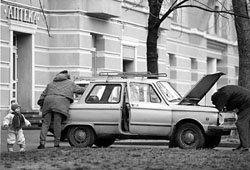AvtoZAZ-Daewoo: No Surrender

On the eve of the professional holiday of machine builders, Verkhovna Rada presented the latter an invaluable gift. It passed a law on altering the governmental tactics of automobile market regulation.
In September 1960, the first batch of low fuel capacity cars leaped off the Zaporizhzhia car works assembly line. That make, one of the best in those times, for it was economical, enduring, equipped with a sufficiently powerful engine and, what is more, simple to handle, was popularly called the “humpback” just for fun. Years kept running by. Forms and tastes were changing. We kept on laughing. 40 years later we understood that a hump is no laughing matter at all...
“In the countries where the national market is not protected by law,” Oleh PAPASHEV, Ukrainian chairman of the board of the AvtoZAZ-Daewoo, told The Day, “The used-car trade is the most lucrative shadow business. It might be for this reason that Verkhovna Rada stuck so painfully the amendments to legislative acts governing the nation’s automobile market. The rabid opponents of the bill (some representatives of the Batkivshchyna faction) tried to convince lawmakers that unopposed import of foreign cars is economically more sound for Ukraine: the more cars are imported, the more filling stations and, hence, jobs and taxes, this will bring forth. But we, carmakers, are guided by different mathematics,” Mr. Papashev continued. “In 1999, 335,000 cars were brought to Ukraine, of which (this is official statistics) only about 20% went through the tax system. I am practical and like operating figures. So let us divide the customs-cleared income (UAH 292 million) by the total number of cars brought in. As a result, the state got approximately a $160 revenue from one foreign-made car. Let us count on this. In the same 1999, AvtoZAZ-Daewoo sold 6054 Tavriyas, paying UAH 34.3 million in taxes. Let us divide this. We get UAH 5665 or $1045. Please compare $1045 on one Tavriya we produced and $160 on an imported Mercedes, BMW, Toyotas, and other prestigious foreign makes. What is more, the minimal customs duty clause was still valid at the time. Excuse me, but what did we mean by the word privileges, so often used to pull us down a peg?’ If the word was used in the original meaning, who did the state grant these privileges to, to us, the national producer, or them, the national bureaucrats, who have ruined this country’s economy?”
According to Mr. Papashev, the lifting of the minimal customs duty and the extension of the age limit for foreign-made cars being imported into Ukraine have jeopardized Ukraine’s whole automotive industry (suffice it to recall the Korean investor’s threat to quit the Ukrainian market and the hand-wringing of our bureaucrats over the possible consequences). Our industrialists needed the government- promised compensatory measures like fresh air. AvtoZAZ-Daewoo’s attempt to boost sales by cutting product cost (over the past year, the retail price of a Tavriya has dropped to $2000) was not crowned with success. While the national producer, capable of turning out cheap items, was eating up its authorized capital, and the people of Ukraine was investing in the West.
The new law is to be signed by the President within two weeks. Then, after being registered at the Ministry of Justice, it will be made public. Consider its main provisions: the law has doubled import duties and excise rates, temporarily banned residents of Ukraine from bringing foreign cars to Ukraine, and introduced mandatory certification of the imported cars.
In the words of Mr. Papashev, this is only the first step of legislative changes. “I do not want to cherish the illusion that the adoption of the law will drastically boost sales,” he said. “There still are too many ways of customs-free import into this country. But the important thing is that the state aims to create a civilized market. If things go on like this, our country will eventually achieve success.”
Mr. Papashev’s interview followed by that of WANG YANG NAM, the Korean chairman of the AvtoZAZ-Daewoo board of directors. AvtoZAZ had in fact been idle for two years until a joint venture was set up. The bulk of the equipment was worn out. This is why Daewoo has earmarked $25 million for renovation and simultaneously analyzed all complaints and remarks. Before launching large-lot production, experts checked every allegedly critical component and revised all technical processes. “In addition,” Mr. Wang said, “we managed to convince the workers that they are able to put out reliable and competitive products.”
The joint venture management shared with The Day their views about the enterprise’s prospects. According to Mr. Wang, the idea of Ford taking over Daewoo Motors is unrealistic at the current stage. Ford is unable today to offer Daewoo the amount originally agreed upon. Daewoo Motors is seeking other buyers. The corporation will have collected all bids by October 20 and will then consider the most lucrative option. “However,” Mr. Wang Yang Nam continues, “the question of who will buy Daewoo Motor to set up a joint venture in Zaporizhzhia is not so important. What is important is to convince the investor that the joint venture does have prospects. From the financial angle, we will be able to exist independently in the two nearest years. We should make ourselves strong within this time and prove that the enterprise is worthy of making part of one car-making group or another. State support is indispensable here.”






